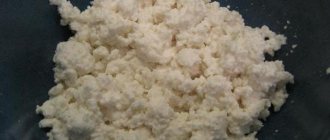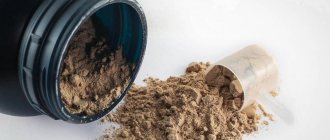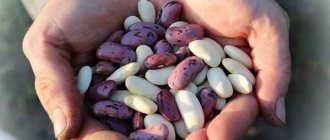What are the benefits of daikon?
The vegetable is rich in calcium salts, which help remove toxins from the body and excess moisture. Beta-carotene is found in large quantities. It helps strengthen the immune system.
Of all the variety of vegetable crops, only radish, horseradish and daikon are able to cleanse the kidneys and liver of various toxins, as well as dissolve stones.
Reference! White radishes do not have a bitter taste and do not stimulate the heart muscle. Because of this, the root vegetable can be consumed by older people who have kidney problems.
The vegetable contains phytoncides in large quantities - elements that prevent the development of microbes, thereby preventing the development of infectious diseases.
For women
White radishes are rich in vitamin B9 or folic acid. For the female body, this element plays a significant role in normalizing the menstrual cycle, as well as the process of hematopoiesis in the girl’s body.
For men
The vegetable contains protein, which promotes the growth of muscle mass, which means that athletes should pay special attention to the root vegetable.
Also, with regular consumption of the vegetable, the effect of beneficial elements is aimed at enhancing male libido and increasing potency.
During pregnancy and breastfeeding
Women who are planning a pregnancy should increase their intake of foods with vitamin B9 in their daily diet.
As for breastfeeding, radishes should not be introduced into the mother’s diet in the first two months of the baby’s life. This is due to several factors:
- Mother's consumption of radish leads to strong fermentation in the baby's intestines, which causes colic and pain.
- After eating the root vegetable, mother's milk begins to acquire a bitter taste.
On the other hand, if daikon is properly included in the mother's diet, it can bring a lot of benefits, especially in winter. At the 4th month, the baby’s digestive system begins to strengthen, and the baby’s body prepares to accept new food. At this time, you can introduce this vegetable into your mother’s diet.
Important! You should not eat a salad made from this root vegetable; for an experiment, squeeze out the daikon juice and drink 1 teaspoon, diluted with water. Should be taken in the first half of the day, not on an empty stomach.
If after this the baby does not have any stomach problems, then you can move on. After a few steps, you can not just drink the juice of the root vegetable, but try to consume it in its natural form. First, it is recommended to eat ¼ of the entire daikon; the vegetable should be grated on a medium grater and soaked in water.
Recommended reading: Benefits of eggplants
For children and elderly
Children should be given root vegetables at 3-4 years of age. There is no need to force the child. However, if he liked the vegetable, then it is important to ensure that he does not overeat and his stomach is not clogged with a large amount of fiber.
But older people need to consume root vegetables with caution, since with age, digestion becomes weaker and various diseases develop.
But if desired, you can drink root juice in small quantities. It is a mild laxative and diuretic.
The benefits and harms of daikon
The word "daikon" is translated as "Japanese radish." The vegetable is also called "big root". This name was given to it because of the large size of the fruits. They can reach 40 cm in length and 700 g in weight. The vegetable grows well in temperate climates.
It has a pronounced aroma and mustard taste. The root vegetable is included in the daily diet of the Japanese. It is consumed both fresh and cooked. This demand is due to the following beneficial properties of daikon:
- prevention of respiratory diseases due to phytoncidal properties;
- normalization of the nervous system;
- restoration of thyroid function;
- strengthening hair, nails and teeth;
- whitening property;
- assistance in weight loss;
- improvement of brain activity;
- treatment of skin diseases;
- diuretic and laxative effects on the body;
- strengthening the immune system;
- improving the composition of seminal fluid;
- normalization of urination.
Daikon has a general strengthening effect on the body. First of all, it restores the immune system, replenishing the supply of vitamins and minerals in the body. In folk medicine, it is often used to eliminate hangover syndrome. The root vegetable is able to remove toxic substances from the body resulting from the breakdown of ethyl alcohol. In addition, it stops the inflammatory process and helps cope with infectious diseases. The healing vegetable is often introduced into the diet as part of a therapeutic diet. It helps the body recover faster after suffering serious illnesses or surgery.
For anemia, the product is usually consumed together with carrots and beets. This combination improves well-being and restores iron levels in the body. In some cases, Japanese radish juice is used as an antiparasitic agent. It is often used to prevent helminthiasis. The particular importance of the product is noted in relation to the functioning of the digestive system. It increases the number of beneficial bacteria, which has a positive effect on the food processing process.
The benefits of daikon for the human body are expressed in its rich vitamin composition. But with excessive consumption of the product, even vitamins can be harmful to health. This is due to the high content of fiber and various acids. Due to them, the product has an irritating effect on the mucous membrane of the digestive organs. Stool upset, nausea and abdominal pain may occur.
Warning! In some cases, an allergic reaction develops due to overeating.
Is daikon good for weight loss?
To lose weight, nutritionists recommend eating fresh daikon, since this way all macro- and microelements are fully preserved. It also has minimal calorie content. Due to this feature, the root vegetable can be included in the daily diet of those losing weight.
Before going to bed, you should drink daikon juice. To do this, you need to grate the fruit on a fine grater and squeeze out the juice. You should drink ½ glass. If the taste is unpleasant, you can mix it with apple or carrot juice.
Regular consumption of fresh vegetable salad along with daikon will speed up the process of losing weight. It is recommended to eat daikon at least once a week for any diet.
Chemical composition of daikon root vegetables
The health benefits and harms of daikon radish are determined individually. In most cases, the product has an extremely positive effect on all vital mechanisms. This is due to its rich chemical composition. It includes:
- ascorbic acid;
- calcium;
- phosphorus;
- sodium;
- vitamins H, A and C;
- retinol;
- manganese;
- copper;
- chlorine;
- sulfur;
- iodine;
- selenium.
The antibacterial effect of Japanese radish is achieved due to the content of phytoncides. The high nutritional value is due to the presence of beneficial enzymes that trigger metabolism. The cleansing function is performed by the fiber present in daikon in large quantities. Daikon also contains enzymes that facilitate the digestion of foods high in starch. Due to the content of a large amount of isojordanic acid, the product prevents the occurrence of malignant neoplasms.
Vitamins in daikon
The main benefit of daikon radish for the body is to replenish the supply of vitamins. Thanks to this, the body’s defenses are activated. He becomes less susceptible to various diseases. The presence of vitamin C in the composition is considered especially important. It is extremely necessary for the body during the cold season, as it has a stimulating effect on immune processes.
Micro- and macroelements
Micro- and macroelements are involved in all life processes. By replenishing their levels, Japanese radish reduces the risk of developing various diseases. It is believed that daily consumption of juice from the root vegetable helps normalize the functioning of the liver and kidneys. This occurs due to the acceleration of enzyme production in the body.
The presence of magnesium in daikon ensures the normalization of the nervous system. As a result, irritability decreases and brain activity activates. Replenishing iodine reserves with root vegetables eliminates the likelihood of developing thyroid diseases. Due to its calcium content, the product has a strengthening effect on the teeth and skeletal system. In addition to this, the condition of the skin and hair improves.
Calorie content of daikon
The calorie content of daikon radish is 21 kcal per 100 g of product. This makes the root vegetable absolutely harmless to the figure. It is allowed to be eaten as part of the diet. The amount of carbohydrates in daikon is 4.1 g, proteins - 1.2 g. The product does not contain fat.
Glycemic index of daikon
Patients with diabetes need to know what glycemic index (GI) the product has. This allows you to control your blood sugar levels. The GI of Japanese radish is 15 units, which is considered quite acceptable. Therefore, daikon is not prohibited for use in type 2 diabetes. On the contrary, it helps control sugar levels and improve metabolism.
Comment! The longer a product is stored in the refrigerator, the more bitter its taste becomes. But at the same time, the function of the enzymes present in its composition improves.
The use of daikon in folk medicine
The vegetable is used in medicine to treat many diseases, as well as generally strengthen the immune system:
- Treatment of wounds, scratches, cracks and other skin damage. To do this, the root vegetable should be grated and applied to problem areas.
- Anti-cold use. To remove sputum, 50 grams of root juice are mixed with honey and drunk.
- To treat arrhythmia, the vegetable is grated and covered with granulated sugar. Then the resulting juice should be drunk before meals, 1 tablespoon 3 times a day.
- Canned daikon can help with anemia. It is necessary to grate the radish, carrots and beets, mix and place in the oven for 3 hours. Take 1 tablespoon 3 times a day.
- Patients suffering from radiculitis and rheumatism will benefit from a mixture of daikon, honey and water in a ratio of 3:2:1.
White radish for cough
A recipe of white radish with honey helps patients get rid of cough. Every housewife should have it. This mixture can be taken by both adults and children.
Rules for preparing the product:
- the top of the root crop is cut off;
- the core is scraped out;
- the space is filled with honey;
- after 12 hours, the root vegetable begins to release juice, which is mixed with honey.
We recommend reading: Beneficial properties of vegetables, which ones are better
After this, the resulting mixture can be drunk.
But there are other options for how to cook daikon. For example, finely chop a peeled vegetable into cubes, place in a container and add 3 tablespoons of honey. Close the lid and leave for 12 hours. Afterwards you can drink the resulting juice.
The duration of treatment is 10 days. Children should drink a teaspoon 2 times a day before meals. And adults take a tablespoon in the same way.
Recommendations and contraindications when taken with honey
Daikon with honey is used as a “vitamin bomb” . This composition treats many ailments, including cough. But you need to remember that this composition is not suitable for everyone. Under no circumstances should you eat radishes if you have diseases of the gastrointestinal tract, or after a heart attack.
Honey is an allergenic product, so you should not treat a cough in exchange for exacerbation of allergies or worse, asthma. In pregnant women, this composition can cause heartburn, and it is also a laxative.
Despite the fact that daikon is recommended for consumption by people with diabetes, honey is not recommended for this category of people. Honey is also dangerous for people with heart failure.
For people who are trying to lose weight, honey is also contraindicated because it is a high-calorie product.
For those who can use this composition, excellent product possibilities open up. Honey with daikon is used as mustard plasters or as a tincture for skin diseases .
In any case, it is better to consult a doctor before using such medications, especially if you have chronic diseases.
When consuming daikon, it is important not to harm your body , so carefully study the contraindications or consult a specialist. Don't experiment with your health! If this product is not contraindicated for you, then you will be surprised how your body will be enriched with useful substances, which will affect your well-being and appearance.
Our other materials will help you grow a medicinal vegetable yourself. Read about the rules and timing of planting daikon radish in various regions of Russia.
What can you cook from daikon?
White radish is a root vegetable that goes well with any vegetables. Therefore, you can prepare a huge variety of salads from it. It can also be combined with other products.
Daikon dishes:
- various salads;
- meatball sandwich;
- Japanese croquettes;
- cutlets;
- aspic;
- rolls;
- steaks;
- marinate the vegetable;
- Miso soup;
- carbonara, udon;
- sushi.
How to store daikon
There are several ways to store root vegetables.
Storing fresh vegetables in sand for the winter. Initially, you should select the cleanest fruits possible. Then lay them in layers in wooden boxes. Cover each layer with wet sand. Moisten the sand regularly to prevent the radish from drying out. Place the boxes in a room with low temperatures with minimal penetration of sunlight.
Storing daikon in the refrigerator. Wrap each fruit in plastic with small holes. Place in the vegetable compartment. Regularly evaluate root crops for rot.
Storage in an apartment or closet. On the balcony you need to cover the vegetables with a cloth to prevent them from freezing. And the temperature of the closet should not exceed +8 C.
Freezing. Remove the stems and wash the daikon. Cut the fruit into small pieces or grate. Place in polyethylene and in the freezer.
Juice storage, canning. Steam and warm the jars. Squeeze out the juice. Pour into containers and roll up. Store in a cool, dark place.











